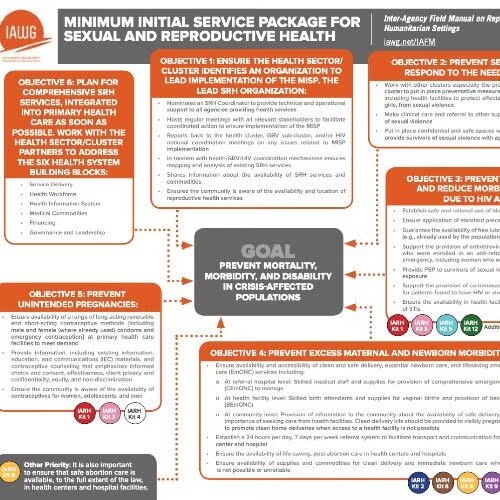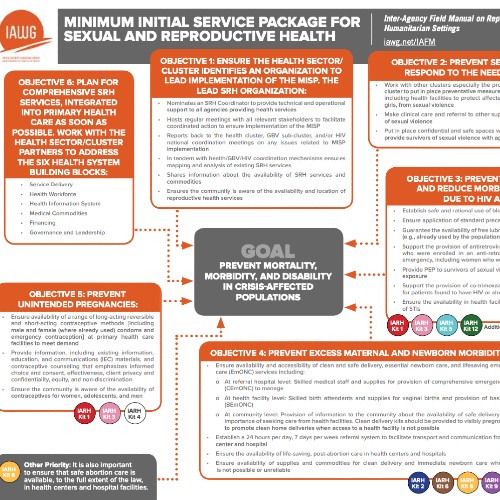The Minimum Initial Service Package (MISP) for Sexual and Reproductive Health (SRH) in crisis situations is a series of crucial, lifesaving activities required to respond to the SRH needs of affected populations at the onset of a humanitarian crisis. These needs are often overlooked with potentially life-threatening consequences.
Over 500 women die in pregnancy or childbirth every day in humanitarian and fragile settings. It is therefore essential to provide lifesaving SRH services as morbidity and mortality related to SRH is a significant global public health issue and those in humanitarian and fragile settings often face heightened risks and additional barriers to SRH services. The timely provision of SRH services can prevent death, disease, and disability related to unintended pregnancy, obstetric complications, sexual and other forms of gender-based violence, HIV infection, and a range of reproductive disorders.
The MISP is developed by the Inter-Agency Working Group for Reproductive Health in Crisis (IAWG). UNFPA, in partnership with stakeholders, supports the implementation of the MISP to make sure that all affected populations have access to lifesaving SRH services. The key aims of the implementation are that there is no unmet need for family planning, no preventable maternal deaths and no gender-based violence (GBV) or harmful practices, even during humanitarian crises.
1. Ensure the Health Sector/Cluster identifies an organization to lead implementation of the MISP.
2. Prevent sexual violence and respond to the needs of survivors.
3. Prevent the transmission of and reduce morbidity and mortality due to HIV and other STIs.
4. Prevent excess maternal and newborn morbidity and mortality.
5. Prevent unintended pregnancies.
6. Plan for comprehensive SRH services, integrated into primary health care as soon as possible. Work with the Health Sector/Cluster partners to address the six health system building blocks.
What is the MISP and what is UNFPA’s role?
-
MISP is a set of minimum lifesaving SRH interventions. However, ‘minimum does not mean ’only’ – if the context makes it possible to provide more SRH services, then this should be done.
-
Implementing the MISP is not optional or negotiable, it is an international standard of care that should be implemented at the onset of every emergency. It is one of the Sphere standards, and it is aligned with the lifesaving criteria of the United Nations Central Emergency Response Fund (CERF).
-
The MISP was developed based on well-documented evidence of RH needs in humanitarian settings and can therefore be implemented without initial needs assessments.
-
The MISP can be broken down into three main areas:
-
Coordination with national stakeholders (objective 1), which is a core component of UNFPA’s work with partners during emergencies that enable the service objectives.
-
Four clinical services (objectives 2-5), which are the minimum medical service components of the MISP, and
-
Transitioning to comprehensive SRH (CSRH) services (objective 6). As soon as the situation permits, UNFPA, together with national partners and stakeholders, coordinates and supports the transition from MISP to quality CSRH care under the framework of health system strengthening (HSS) and its building blocks. This support is context-specific and builds on the lessons learnt from implementing the MISP during the emergency response.
-
UNFPA strives to ensure that MISP activities and additional SRH services are included in all phases of the humanitarian programme cycle.
Initial To be used in an emergency without the need of prior assessment
Services Services to be delivered to the affected population
Package Supplies such as RH kits and other SRH activities, coordination and planning
Related important resources
-
The Inter-Agency Field Manual on Reproductive Health in Humanitarian Settings (IAFM)
-
The MISP Cheat Sheet (available in English, French, Portuguese and Spanish)
-
The Interagency Emergency Reproductive Health (IARH) Kit Manual (currently being updated)
-
WHO and UNFPA document on SRH during protracted crises and recovery



